My first lesson ever with my new year 10 class was at the worst time possible – last period on Friday of the first week back at school. Our topic? Poetry (OK, the topic is consumerism, but the text form is poetry). I knew that I couldn’t stand up and talk at the kids, or even get them to do a writing task. Why? I’m the new teacher, they’re in year 10, you work it out. So, I went for a hands on hook lesson.
I’ve done a similar lesson to this before with year 7 last year. I had the students work on a range of poetry-related activities for 5 minutes, then move to the next ‘station’. This time I added a couple of new activities, relevant to the age and skill level of my new students. Below is a list of the activities:
– What is poetry?
Students had to work in their small team to come up with a detailed analogy for poetry. They recorded this on a piece of A3 paper.
– Lego Poetry
Students wrote micro poems using a box of Lego where each brick has a different word on it – I used BrickStix for this, which you can buy online.
– Poetic Terms
In teams, students brainstormed and recorded all the poetic devices they knew and wrote examples of each.
– Instant Poetry
Using the iPad app, ‘Instant Poetry 2’, students wrote poems and matched them to a background. The poems were saved to a gallery. This is like digital magnetic poetry – hard but fun.
– Blackout Poetry
This is where students take a photocopy of an existing written text and a black marker and create a poem. I gave my students pages from James Paul Gee’s book ‘The Anti-Education Era’. Fun!
– Post-It Poetry
I took a very short famous poem (Emily Dickinson’s ‘If I can stop one heart from breaking’) and wrote each word on a Post-It. I then put these out in a random order, and the students had to try to put the poem back together!
Needless to say, the lesson was noisy but fun. It was great getting to know my students by the way the engaged with the tasks, and with each other. Also, it was nice seeing the furniture in the classroom being moved around so the desks weren’t all facing the front. I’m really looking forward to learning with this class, I think they’re going to be high spirited and engaged. Lucky me!

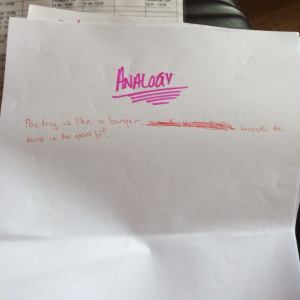
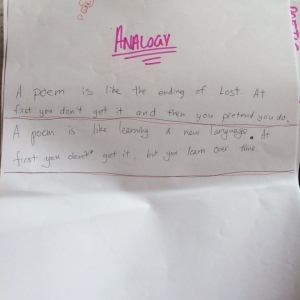
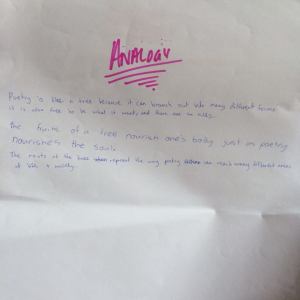
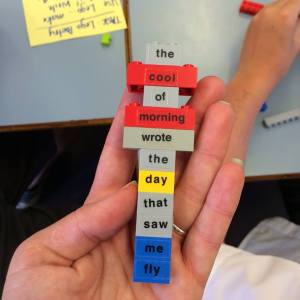
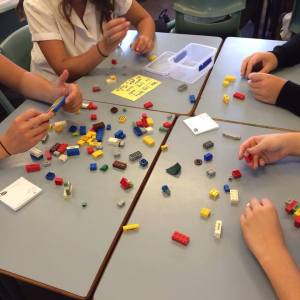
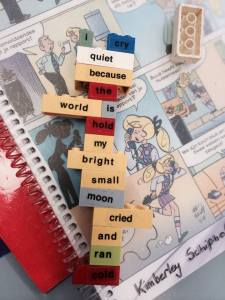
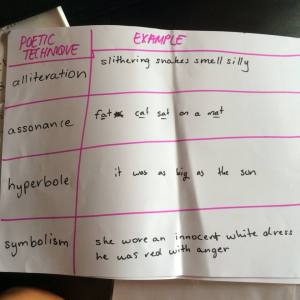
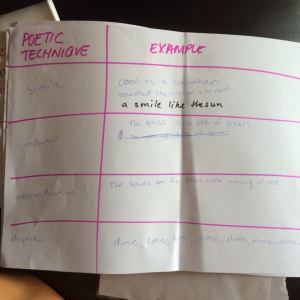
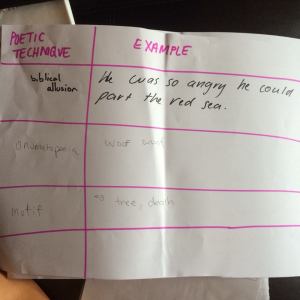
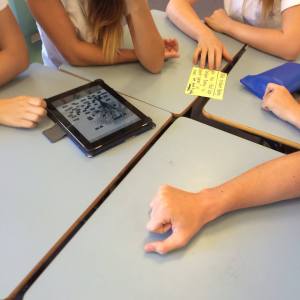
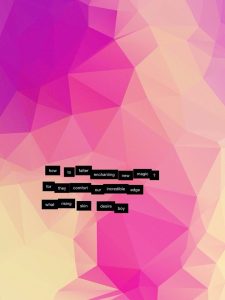
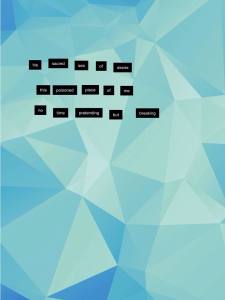
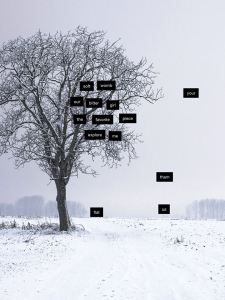
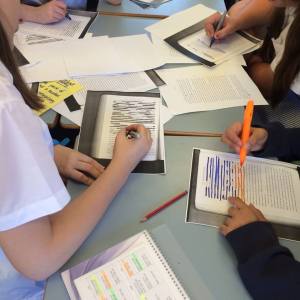
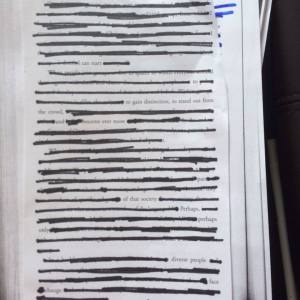
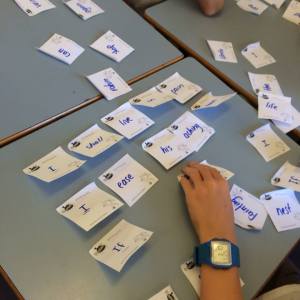
Awesome!
Thanks, Greg 🙂
Wow – what a great lesson. Bet your new class is saying “this new teacher is pretty cool “
Thanks, Sue! I sure hope so 🙂
Beautiful! While having fun, they have engaged with the idea of poetry through the conceptual lenses of form, function, change and connection (IB PYP, I think in those terms!)
Thanks! I love the PYP stuff – so good with the metalanguage. Hoping my son can do IB when he’s older 🙂
Looks like a lot of fun. How long was the lesson?
60 minutes. They have longer lessons at MSC, which is great!
If you could just blog what you’ve done during the week, I’m pretty sure I’ll never have to think up a cool activity again! Love the lego poetry – my Year 5 class would love that. We could do crazy sentences for a 10 minute warm up. Thanks for sharing!
I like the sound of crazy sentences!
These are great station activities. Especially love the Blackout Poetry and poetic terms ideas. Hope you don’t mind me using some of these ideas for History/Geography teaching. Always love seeing what you’ve got happening in the classroom, teaching the same levels as me.
(P.S. – One thing I had to smile about – recognised the timetable program in one of the pictures – and we have 60min lessons, too.)
Absolutely! Make sure you share how it goes 🙂
Bianca this is a totally awesome lesson. I hope I get to use your ideas if I ever get to get back in the classroom!! Amazing.
You’ll be back before you know it 😀
Thanks Bianca, I’ve been tasked with making year six writing more complex and creative. I’m using spoken word poetry to unlock their creativity and some of these exercises will be great!
Your welcome, Yael!
Very cool. I want to be in your class.
Haha, thanks Sue. They might not always think it’s fun 😉
I had a similar situation last year with my Yr 11 English Studies. You could add this one into your poetry activities. I took the class down to the library for half the lesson. There task was to make a poem using the titles on spines on books. They had to arrange the books so you could read the poem. They were asked to take a photo of their poem. Of course the poem had to be about the theme of the unit. The students loved it and both the librarian and I were excited to see some of the students really looking at books on the shelves, something quite a few of them had not done for a long time!
This is brilliant! Thanks so much for sharing your idea with me!
Bianca….you continue to inspire! Thank you!!!
Awww, thanks 🙂
This is a truly varied and hands-on lesson- though I think it might take 2 periods for my kids. I’m looking forward to trying it out! Thanks 🙂
Thanks, Felicity.
I am a maths teacher who reads your blog with great interest. I am sort of conflicted between the need for “drill and practice” and the wish to “engage ” the kids. Are these mutually exclusive? Not sure about PBL and mathematics teaching.
Hmmm. I’d say that ‘drill and kill’ probably is awful only when it’s the only activity students do. Practice is essential for every skill, but teachers can make that practice engaging as well. I think Maths work is probably like writing essays, it is a highly skilled activity that takes time to developed. Kids resent learning the art of essay writing BUT arguing one’s point concisely, with relevant evidence, is a life skill.
There’s some really awesome examples of PBL in Maths, and in cross-curricula projects that incorporate Maths. Here’s a good place to look: http://wveis.k12.wv.us/teach21/public/project/MainMenu.cfm?tsele1=2
Hi Bianca, I love this poetry lesson that you did with your Year 10s. I’ve been looking for new ways to teach my students how to write poetry. You have given me a lot of new ideas to try out as well as a way to create Lego poetry which is something that I’ve been wanting to do. Thanks
Thanks for including us! Our Poetry BrickStix are now on sale: http://www.brickstix.com/product-category/sale/
Hi Bianca, I read this post at the start of the year and I was determined to use some of your strategies. 2 days ago, 4 of my Year 9 students introduced Blackout and lego poetry to 40 other year 9 students as part of our writer’s festival. Each year 9 class had to run an activity for 2 sessions. Whilst my students were planning the session, I shared your post with them and they selected 2 of the activities. They tested it with their own classmates and then ran the 2 sessions. All the students enjoyed the sessions. Thanks for sharing your strategies.
Pingback: Voices in the Village (2015) | Read Write Respond